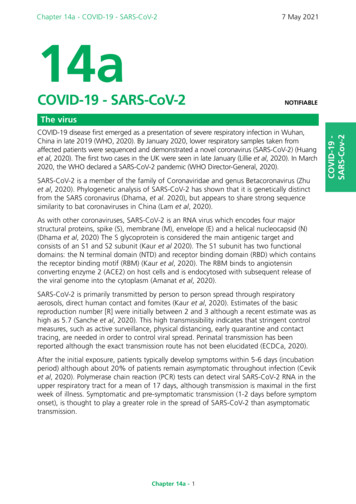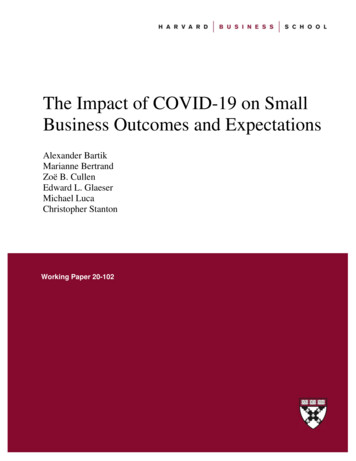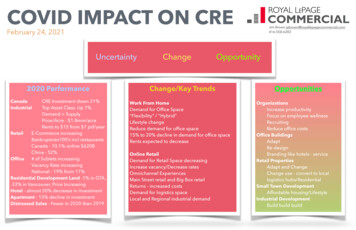
Transcription
FINTECH: CHALLENGER TO COMPETITORTHE IMPACT OF COVID-19 ON THE FINTECH SECTORA Robert Walters Group Company
INTRODUCTIONIn 2019, Robert Walters – one of the leaders inrecruitment for Financial Services and Technology– and Vacancy Soft – trusted provider of leadgeneration, client intelligence and market analysisfor the recruitment industry – produced theindustry leading reports The UK Fintech Revolutionand the 2019 Fintech Salary Survey.One year on, we have partnered togetherto conduct an extensive data analysis of jobvacancies and hiring activity within the fintechlandscape. The report also considers theimmediate and future impact the coronaviruspandemic will have on the fintech sector in the UK.
CONTENTS1. Key Statistics2. Covid-19: Current Climate3. Banking: A Cultural Shift4. Fintech: Here to Stay5. Spotlight: The Unicorns6. Talent Hotspots7. Future: Blurring the Lines8. Key Findings1. Key Statistics2. Covid-19: Current Climate3. Banking: A Cultural Shift4. Fintech: Here to Stay5. Spotlight: The Unicorns6. Talent Hotspots7. Future: Blurring the Lines8. Key Findings
KEY STATISTICSMOST POPULAR FINTECH PRODUCTS & SERVICES IN 2020UK1.Borrowing &Lending2.Messaging &Communication3.PaymentsFINTECH53%increase in overalljob creation in last 3years50%increase in tech roles withinbanking in UK regions since 2017(Birmingham, Manchester, Leeds)16%increase in overalljob creation in 201923%2. Covid-19: Current Climateincrease in techvacancies in last 3years6%increase in techvacancies since20191/3increase in tech roles withinbanking since 2017 (London)1. Key Statistics45%of job roles advertised in bankingare within tech3. Banking: A Cultural Shift4. Fintech: Here to Stay5. Spotlight: The Unicorns6. Talent Hotspots7. Future: Blurring the Lines8. Key Findings
INVESTMENT 48bn80%No.11,400total investmentinto UK fintechs in2019of VC fintechinvestment intoEurope goes toUK-based firmsthe UK gets the mostfintech investment inEurope, andis second in theworldEU firms haveapplied for FCApermission to havea base in the UKBANKING & FINANCIAL SERVICES:1/3job roles advertised is techrelated46%increase in tech vacanciesin last three years73%UK adoption rates of online bankingin 20191. Key Statistics2. Covid-19: Current Climate3. Banking: A Cultural Shift4. Fintech: Here to Stay5. Spotlight: The Unicorns6. Talent Hotspots7. Future: Blurring the Lines8. Key Findings
COVID-19: THE CURRENT CLIMATEThe impact of Covid-19Rapid and unprecedented measures taken as a result ofthe global Covid-19 outbreak has left several industriesparalysed for the first half of 2020.The unexpected market freeze has placed mountingpressure on banks and financial services firms as borrowing,defaults and payment holidays are required en masse.With calls for banks to improve their digital offering, improvecustomer service and shake-up traditional methods oflending, the pandemic has provided fintechs with theopportunity to prove their worth.The opportunityFintechs best placed to ride out this crisis will be thoseinvolved in lending. In addition, as normal restrictions onlending are waived to enable companies to ride out thecrisis, artificial intelligence (AI) will play a key part in enablingthe financial services sector to provide simultaneous supportto thousands of businesses – at a rate far greater than thecapacity of their current underwriting team. As a result, AIdriven fintech lenders will be the biggest ‘winners.’1. Key Statistics2. Covid-19: Current Climate3. Banking: A Cultural Shift4. Fintech: Here to Stay5. Spotlight: The Unicorns6. Talent Hotspots7. Future: Blurring the Lines8. Key Findings
1. Key Statistics2. Covid-19: Current Climate3. Banking: A Cultural Shift4. Fintech: Here to Stay5. Spotlight: The Unicorns6. Talent Hotspots7. Future: Blurring the Lines8. Key Findings
BANKING: A CULTURAL SHIFTThe worldwide Covid-19 outbreak has impactedthe way businesses currently operate and will bringabout long-term changes to the way the UK doesbusiness.Lockdown and social distancing measures meanthat banks have had no choice but to scale backtheir retail operations, instead pushing customerstowards digital platforms. The UK has one of thehighest adoption rates of digital and online banking –growing by 32% in the last 10 years.Adoption rates of online banking in the UK were atan all-time high of 73% in 2019, with the majority ofusers accessing platforms via smart phones (64%)rather than over tablets (34%). The adoption rate ispredicted to be significantly higher in 2020.ONLINE BANKING PENETRATION IN GREAT BRITAIN80%70%60%50%40%30%20%10%0%2007 2008 2009 2010 2011 2012 2013 2014 2015 2016 2017 2018 2019PENETRATION OF ONLINE BANKING IN THE UK BY TABLET &SMARTPHONE70%60%50%40%30%73%20%10%UK adoption ofonline bankingTablet OwnersQ1 2019Q4 2018Q3 2018Q2 2018Q1 2018Q4 2017Q3 2017Q2 2017Q1 2017Q4 2016Q3 2016Q2 2016Q1 2016Q4 2015Q3 201502 2015Q1 2015Q4 2014Q3 2014Q2 2014Q1 20140%Smartphone Owners*STATISTA1. Key Statistics2. Covid-19: Current Climate3. Banking: A Cultural Shift4. Fintech: Here to Stay5. Spotlight: The Unicorns6. Talent Hotspots7. Future: Blurring the Lines8. Key Findings
This trend coincides with an increase in the number of techvacancies within banks. The percentage of tech vacancies inoverall job roles advertised within banking increasing from 23%in 2017 to 30% in 2019.FINANCIAL SERVICES: ALL PROFESSIONALVACANCIES VS TECH VACANCIES“With the most at risk to Covid-19 also being the ones who traditionallywere the most reliant on counter services, the societal challenge will be tohelp the elderly use banking services online - where their motivation will bethat they simply don’t have a choice.70000600005000023%30%29%40000Assuming they successfully make this switch, retail banking as we know itwill be changed – or in some instances disappear - forever.3000020000As this happens, increasingly there will be little to separate banking andfintech.”100000Tom Chambers, Senior Manager - Technology (London)20172018All Banking Vacancies2019Banking Tech Vacancies1/3of job roles advertised inbanking are within tech1. Key Statistics2. Covid-19: Current Climate3. Banking: A Cultural Shift4. Fintech: Here to Stay5. Spotlight: The Unicorns6. Talent Hotspots7. Future: Blurring the Lines8. Key Findings
FINTECH: HERE TO STAYDespite Brexit, the UK remains an attractive hub for fintechs.Growth of the sector can be illustrated by the ongoing increasein vacancies since 2018 - up 16% in 2019, and 53% since2017.Comparatively, tech roles within fintechs have grown at aslower pace, with volumes up 6% since 2019 and 45% since2017.However, the percentage of tech vacancies in overall job rolesadvertised within the fintech sector has decreased by around4% in the last year.Tom Chambers, Senior Manager - Technology (London)“When looking at the slight slowdown in tech roles withinfintech, the impact of Brexit and regulation can be seen here.Professional vacancies within legal, change management,and risk grew in fintechs as companies have been forced toprepare for leaving the single market.”FINTECH: ALL PROFESSIONAL VACANCIESVS TECH 0182019All Professional Vacancies1. Key Statistics2. Covid-19: Current ClimateTech Vacancies3. Banking: A Cultural Shift4. Fintech: Here to Stay5. Spotlight: The Unicorns6. Talent Hotspots7. Future: Blurring the Lines8. Key Findings
LONDON VS REGIONSBANKING TECH VACANCIES: LONDON VS UK REGIONSBanking & financial servicesThere has been significant growth outside the capitalin banking & financial services, where tech vacancieshave increased by 50% since 2017, and 7% in2019.In London, tech vacancies within banking haveincreased by 23% over the past three years, butstagnated last year – growing by only Q12018Q22018LondonFintechsIn contrast, fintech remains London-centred, wherethe growth in tech vacancies is primarily in the capital.London tech vacancies have increased by 31%since 2017.The concentration of VC funding in London isevidenced by the downturn in regional vacancies in2019 compared to the previous year, with investmenttypically going into firms based in the capital.For context, in 2018 there were 50 fintech dealsof 1m or more within the UK, of which 45 were inLondon. In 2019, the number of investments hadnearly doubled (96) yet only 8 were into regionalbusinesses (under 10%).1. Key Statistics2. Covid-19: Current Climate3. Banking: A Cultural 019UK RegionsFINTECH TECH VACANCIES: LONDON VS UK Q42017Q12018Q22018London4. Fintech: Here to Stay5. Spotlight: The Unicorns6. Talent HotspotsQ32018Q42018Q12019Q22019UK Regions7. Future: Blurring the Lines8. Key Findings
Ahsan Iqbal, Director of Technology (Regions) atRobert Walters“If the government are serious about levelling up the country tocatch up with London, then serious thought needs to be givento how and why London-based businesses remain so muchmore attractive to VC.Work is already being done in Birmingham with HS2, as well aswithin Manchester, Leeds and Liverpool to grow the NorthernPowerhouse.In the last few years, we have seen regions outside the UKestablish their own tech hubs and as a result, are holding ontotalent. We will see this trend continuing into 2020.”1. Key Statistics2. Covid-19: Current Climate3. Banking: A Cultural Shift4. Fintech: Here to Stay5. Spotlight: The Unicorns6. Talent Hotspots7. Future: Blurring the Lines8. Key Findings
SPOTLIGHT: UNICORNSFintech continues to be the leading sector for attracting VCs, as fundingand investment continues to grow year-on-year.In 2019, UK fintechs attracted 48bn in funding – confirming the country’sposition as the number one spot for fintech investment in Europe andsecond in the world.TOP 10 UK FINTECHS RECEIVINGINVESTMENT IN 2019Ben Litvinoff, Business Director at Robert Walters“In Q1 this year, UK fintechs generated almost asmuch investment as they did for the entire year of2017 – highlighting the significance of 2020 for itMonzoEvolution FundingStarling BankGoCardlessOnfidoNutmeg01. Key Statistics1002002. Covid-19: Current Climate3004005006003. Banking: A Cultural Shift7008009004. Fintech: Here to Stay5. Spotlight: The Unicorns6. Talent Hotspots7. Future: Blurring the Lines8. Key Findings
NUMBER OF VC ‘DEALS’ OVER 1M - UK, EUROPE, USAThe UK continues to demand 80% of total VC fintechinvestment into Europe and is outstripping the USAwhen it comes to the growth of VC investment.181614121086420In fact, over the past three years, fintech investmentin the UK has grown explosively by 500%, with theUSA expanding by 170% and Europe by 133%comparatively.Such is the draw for the UK, that a report fromfinancial services regulatory consultancy Bovillrevealed that more than 1,400 EU-based firms haveapplied for permission to operate in the UK after Brexit- with over 1,000 of these planning to establish theirfirst UK office.Q1Q2Q3Q4Q1Q2Q3Q4Q1Q2Q3Q4Q12017 2017 2017 2017 2018 2018 2018 2018 2019 2019 2019 2019 2020UKEuropeUSAVALUE OF FINTECH INVESTMENT PER COUNTRY, PER YEAR ( ) 2bn 1.8bn 1.6bn 1.4bn 1.2bn 1bn 800m 600m 400m 200m 020172018UK1. Key Statistics2. Covid-19: Current Climate3. Banking: A Cultural Shift4. Fintech: Here to Stay5. Spotlight: The Unicorns2019Europe6. Talent HotspotsQ1 2020USA7. Future: Blurring the Lines8. Key Findings
500%growth in UK fintechinvestment in last 5years80%of European fintechinvestment goes to UKfirms1. Key Statistics2. Covid-19: Current Climate3. Banking: A Cultural Shift4. Fintech: Here to Stay5. Spotlight: The Unicorns6. Talent Hotspots7. Future: Blurring the Lines8. Key Findings
HiTALENT HOTSPOTSNON-TECHNICAL SKILLS HOTSPOTS:Non-technical skills hotspots% of fintechtalent poolYOY GrowthRegulatory compliance 56.7%7.10%KYC 51.9%8.60%Fraud Investigations 42.8%9.9%Customer Experience 33.4%8.40%Risk Management 25.8%13.7%Regulatory complianceAs regulated entities, fintechs are required to adhere to the same,if not more stringent, guidelines and decrees by regulators astraditional financial services firms. An ability to meet regulatoryrequirements is integral to starting and operating a successfulfintech. As regulations continue to change and become morestringent, experienced regulatory compliance professionals willbecome increasingly valuable to the sector.KYCFirms having an understanding of who they are transacting with,and on behalf of, is critical to ensuring transactions are compliantwith rules and regulations set out by regulators. As an increasingnumber of customers engage fintech firms, there is a directneed to increase the ability to on-board them in an efficient andcompliant manner. This is accelerating recruitment of complianceprofessionals that can perform KYC checks to limit a firm’slikelihood of being involved in any illegal activity.1. Key Statistics2. Covid-19: Current Climate3. Banking: A Cultural Shift4. Fintech: Here to StayFraud investigationsAI and machine learning capabilities have given rise to a breadthof financial transactions online, and with it, an alarming increase infinancial crime. While AI is helping fintech firms detect fraudulentactivity, specialists in fraud investigation with experience in leadingintricate payment investigations are helping fintechs to improve theirfraud response and boost their fraud prevention strategies.Customer experienceAs the fintech sector becomes overwhelmed with new productsentering the market at a rapid pace, those best placed to succeedwill be the fintechs with clear points of differentiation. As productsoffered become less differentiated, the need grows to acquire newcustomers via strong reviews, CRM, and customer experience, asdoes the requirement for specialists within this area.Risk ManagementAs fintechs continue become more engrained and adoptionrates increase, the need to have robust risk structures in placeis essential. The balance of providing a fast, fluid and responsiveservice to compete in the fintech space, with robust risk controlswill continue to be a challenge. As a result, professionals that canmanage enterprise risk in a prudent manner will ensure the ongoingsuccess of a business.Highest growth in demand:Regulatory compliance 56.7% YOY growth5. Spotlight: The Unicorns6. Talent Hotspots7. Future: Blurring the Lines8. Key Findings
HiTECHNOLOGY HOTSPOTS:UX and UI DesignFintech has continued to challenge the banking industry with itsupper hand in providing ease of use and simple, stylised userapplications. No matter how good the tech is behind the scenes, afintech product propels in value due to firms’ continued investmentin UX & UI Design talent. This is evidenced by the rapid growth ofUX ( 52.3%) and UI ( 40.4%) design skills within the industry.Technology skills hotspots% of fintechtalent poolYOY GrowthUX Design 52.3%7.8%UI Design 40.4%8.1%Product Management 15.8% YOY growthProduct ManagementDemand for product management skills remains steady ( 15%YOY growth) as fintechs at points of scale require product ownersor managers with the right balance of technical know-how,stakeholder management capability and strong customer mindset.Role to watch:Chief Product OfficerAs fintechs continue to scale their product teams, a growingnumber are hiring a Chief Product Officer (CPO) to head upthis function, acting as the organisational ‘bridge’ between thetechnology and the customer interface.1. Key Statistics2. Covid-19: Current Climate3. Banking: A Cultural Shift4. Fintech: Here to Stay5. Spotlight: The Unicorns6. Talent Hotspots7. Future: Blurring the Lines8. Key Findings
HiData Scientists and Machine Learning EngineersLeveraging big data is becoming increasingly key to both the fintechand banking sectors as customer behaviour continues to evolveand become further segmented. With this, adopting MachineLearning and developing predictive analytics enable paymentsproviders to make strides in areas such as understanding customerspending patterns, automating fraud detection and customisingproduct offerings.With this trend, we’re seeing banks and fintechs race to hire datascientists – demand is increasing by 71.2% annually within thefintech space, and 78% in the banking sector.Technology skills hotspots% of fintechtalent poolYOY GrowthNatural Language Processing (NLP) 53.0%9.6%Computer Vision 85.9%6.6%Machine Learning 59.4%9.4%Software EngineersThe financial services space continues the ongoing battle to hire thebest engineers in the constant push for improvements in availabilityof services, reduction of latency and real-time updates. In particular,we’re witnessing exceptional growth ( 81.7%) of ReactJS talent,and DevOps professionals ( 56.5%). More generally, a continuedfocus on the use of APIs, Micro Services engineering, Containersand Cloud platforms are expected to be in force across thedevelopment space.1. Key Statistics2. Covid-19: Current Climate3. Banking: A Cultural Shift4. Fintech: Here to StayTechnology skills hotspotsYOY Growth% of fintechtalent poolQA 46.6%6.3%DevOps 56.5%6.7%React.js 81.7%7.3%SQL 35.3%20.4%InfoSecFinancial service providers have been forced to make majorchanges to their cybersecurity programs and protocols in orderto manage the transition to remote working, leading to a spike ofactivity in the InfoSec space. This trend shows no signs of slowingdown as fintechs respond to cybersecurity threats post-pandemicwith Information Security ( 63.9%) and Cloud Computing ( 41.3%)on a strong annual growth trajectory.As businesses continue to invest in cybersecurity softwareand adopt new platforms, there will be a heavy emphasis onCloud skills, security engineering and site reliability engineering.Professionals involved in security orchestration with strong SIEMskills such as Splunk will be highly valuable, as well as AWScontainer security and micro service security architecture.Technology skills hotspots5. Spotlight: The UnicornsYOY Growth% of fintechtalent poolInformation Security 63.9%6.2%Cloud Computing 41.3%13.4%AWS 51.1%9.1%6. Talent Hotspots7. Future: Blurring the Lines8. Key Findings
Tom Chambers, Senior Manager - Technology (London)“Recruitment within fintech talent hotspots shows no signsof stalling as fintechs look to hire talent within ever-tightertechnology candidate pools. With the recruitment interests offintechs and banking converging in the tech space, competitivesalary packages and generous bonuses will be essential to lurelimited pools of UK talent.”1. Key Statistics2. Covid-19: Current Climate3. Banking: A Cultural Shift4. Fintech: Here to Stay5. Spotlight: The Unicorns6. Talent Hotspots7. Future: Blurring the Lines8. Key Findings
THE FUTURE: BLURRING THE LINESTRADITIONAL BANKING VACANCIES35003000The way in which people engage with technology hasresulted in banks altering their business processes,including a change to internal operations.250020001500In the past five years alone, banks have raced againstthe clock to create smartphone friendly apps, whichprovide the same level of service and accessibility assome of the popular fintech platforms.10005000201720182019Banking Operations VacanciesJob trends: BankingAs this happens, the number of people employed intraditional roles within the banking sector will continueto fall, whilst tech vacancies will continue to holdstrong. Already, total employment in the industry hasfallen in the UK by nearly 100,000 in the last five years.BANKING TECH VACANCIES1400012000Focusing on vacancies within financial services &banks over the last three years, the more traditionaljob roles have declined by -42%, whilst tech vacancieshave increased by 46%. It is important to note,however, that the decline in traditional roles refersmostly to those jobs that can be easily automated ing Tech Vacancies1. Key Statistics2. Covid-19: Current Climate3. Banking: A Cultural Shift4. Fintech: Here to Stay5. Spotlight: The Unicorns6. Talent Hotspots7. Future: Blurring the Lines8. Key Findings
Dan Simmonite. Business Director at Robert Walters“Fintechs were not initially seen as direct ‘competition’ to traditional banks –with their products and services differing vastly.However, over the past 12-18 months we’ve seen fintechs apply for bankinglicenses so they can expand their offering to include overdrafts, guaranteedeposits, and offer the ability to set-up direct debits.Whilst fintechs creep into traditional banking territory, and financial servicescontinue to embed technology into their processes, the sectors stand tobecome indistinguishable in the next year.”1. Key Statistics2. Covid-19: Current Climate3. Banking: A Cultural Shift4. Fintech: Here to Stay5. Spotlight: The Unicorns6. Talent Hotspots7. Future: Blurring the Lines8. Key Findings
KEY FINDINGS1GOVERNMENT SUPPORT OPENS DOORS FORFINTECHS3Unlike traditional banking, hiring for tech roles within fintechhas slowed down in the past year as the sector switcheshiring to legal, regulatory change, and risk roles in order toprepare for a post-Brexit Europe.Banks came under criticism for their customer-facingresponse to the Covid-19 outbreak, with calls for thefinancial services industry to work more closely with fintechcounterparts to better utilise data and improve customerservices.Perhaps the most drastic change for fintechs wasgovernments swift action to ‘shake-up’ traditional lendingand allow fintech companies to be an official loan providerfor the government bailout scheme - introducing fintechs tothe masses.2LOCKDOWN MEASURES FORCE PERMANENTCHANGEOver the past decade, the adoption rate of online bankinghas increased from 32% to an all-time high of 73%. Whilstthe tide was certainly turning, enforced high street bankclosures and cashless payments have dictated that eventhose most reluctant to change must adopt new ways ofbanking and processing payments.BREXIT REMAINS A CONCERNWith the nature of fintech being truly digital – and thereforemuch easier to roll-out internationally – fintechs are nowrealising the task at hand to be compliant with sectorregulations internationally.4REGIONALISATION VS LONDONIt seems traditional banks are taking advantage of the talentpool and cost savings available in regions outside of London– with job creation within banks for tech roles increasing by50% in the last three years. This jump in recruitment hasresulted in the emergence of ‘tech hubs’ in Birmingham,Manchester, and Leeds – mirroring what we see in London’sShoreditch.On the other hand, UK fintechs continue to recruit techprofessionals in London, tactfully locating their operationsfor better access to VC investment.Where banks have been slower in creating smartphonefriendly apps, fintechs are now in a position to take marketshare.1. Key Statistics2. Covid-19: Current Climate3. Banking: A Cultural Shift4. Fintech: Here to Stay5. Spotlight: The Unicorns6. Talent Hotspots7. Future: Blurring the Lines8. Key Findings
5A HIVE OF INVESTMENTLondon has done a stellar job in proving its ROI when itcomes to VC funding and investment. The capital nowattracts the most amount of VC funding in Europe for itsfintech firms and is second in the world only to the USA.The current climate is like nothing we’ve seen before sofintechs should be mindful of their balance books. VCs willconsider fintechs that are rapidly running out of capital asleaving themselves too exposed to external factors. Whilstconfidence for investment has been high up until this point,we can expect VCs to be cautious throughout the rest of2020.6THE LICENCE TO COMPETEWith several fintechs playing an active role in thegovernment bailout scheme, as well as obtaining licencesto be able to deliver traditional banking services such asdirect debits and overdrafts, traditional banks will nowhave to view these once small ‘challenger brands’ asserious competitors who are taking bites at several marketsegments – from Generation Z and Millennials, to SMEs andentrepreneurs.1. Key Statistics2. Covid-19: Current Climate3. Banking: A Cultural Shift4. Fintech: Here to Stay5. Spotlight: The Unicorns6. Talent Hotspots7. Future: Blurring the Lines8. Key Findings
1. Key Statistics2. Covid-19: Current Climate3. Banking: A Cultural Shift4. Fintech: Here to Stay5. Spotlight: The Unicorns6. Talent Hotspots7. Future: Blurring the Lines8. Key Findings
ABOUT THE PARTNERSRobert WaltersRobert Walters is a global, specialist professional recruitment consultancy. Operating across31 countries, with offices in fintech hubs London, , New York, San Francisco, Singapore,Barcelona and Amsterdam organisations rely on us to find high quality professionals for arange of specialist roles. Leaders in technology and financial services recruitment, we placecandidates on a permanent, contract and interim basis in organisations ranging from thelargest corporates world-wide, through to SMEs and start-ups.Tom Chambers, Senior Manager – Technology, Robert Walterse: tom.chambers@robertwalters.comt: 44 20 7509 8863www.robertwalters.co.uk t-waltersVacancysoftVacancysoft is a subscription-based data publisher for the Recruitment Industry. Establishedin 2006, we now have thousands of subscribers worldwide, clients range from FTSE listedbusinesses to industry specialists, whereby we optimise new client generation, key accountmanagement and business strategy. 44 20 7193 6850www.vacancysoft.com 1. Key Statistics2. Covid-19: Current Climate3. Banking: A Cultural oft-llp4. Fintech: Here to Stay5. Spotlight: The Unicorns6. Talent Hotspots7. Future: Blurring the Lines8. Key Findings
AUSTRALIABELGIUMBRAZILCANADACHILECZECH REPUBLICFRANCEGERMANYHONG KONGINDIAINDONESIAIRELANDJAPANLUXEMBOURGMAINLAND CHINAMALAYSIAMEXICONETHERLANDSNEW ZEALANDPHILIPPINESPORTUGALSINGAPORESOUTH AFRICASOUTH www.robertwalters.co.uk
FINTECH: ALL PROFESSIONAL VACANCIES VS TECH VACANCIES 2017 48% 2018 2019 12000 10000 8000 6000 4000 2000 0 All Professional Vacancies Tech Vacancies 50% 46% FINTECH: HERE TO STAY Tom Chambers, Senior Manager - Technology (London) “When looking at the slight slowdown in tech roles within











